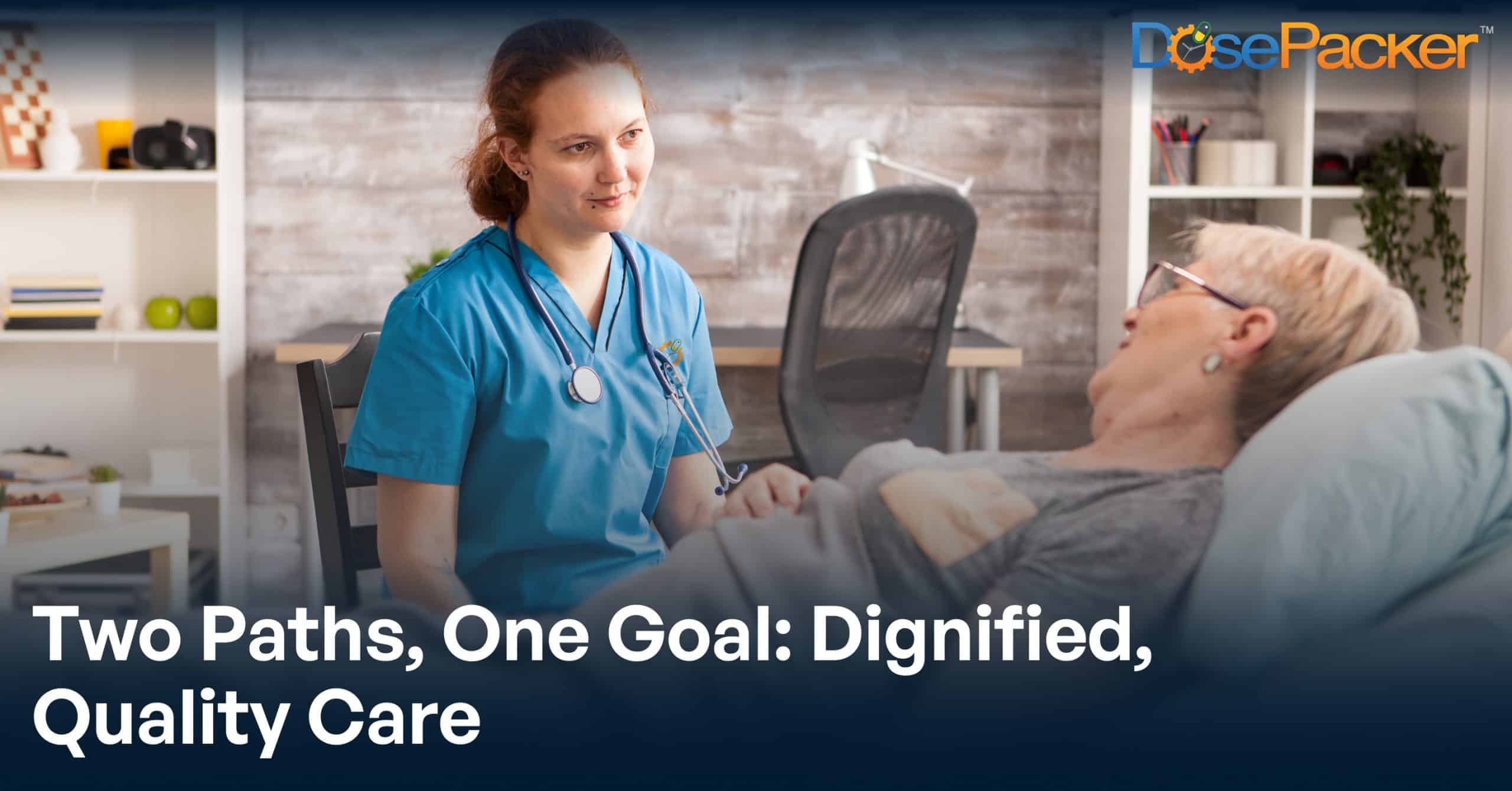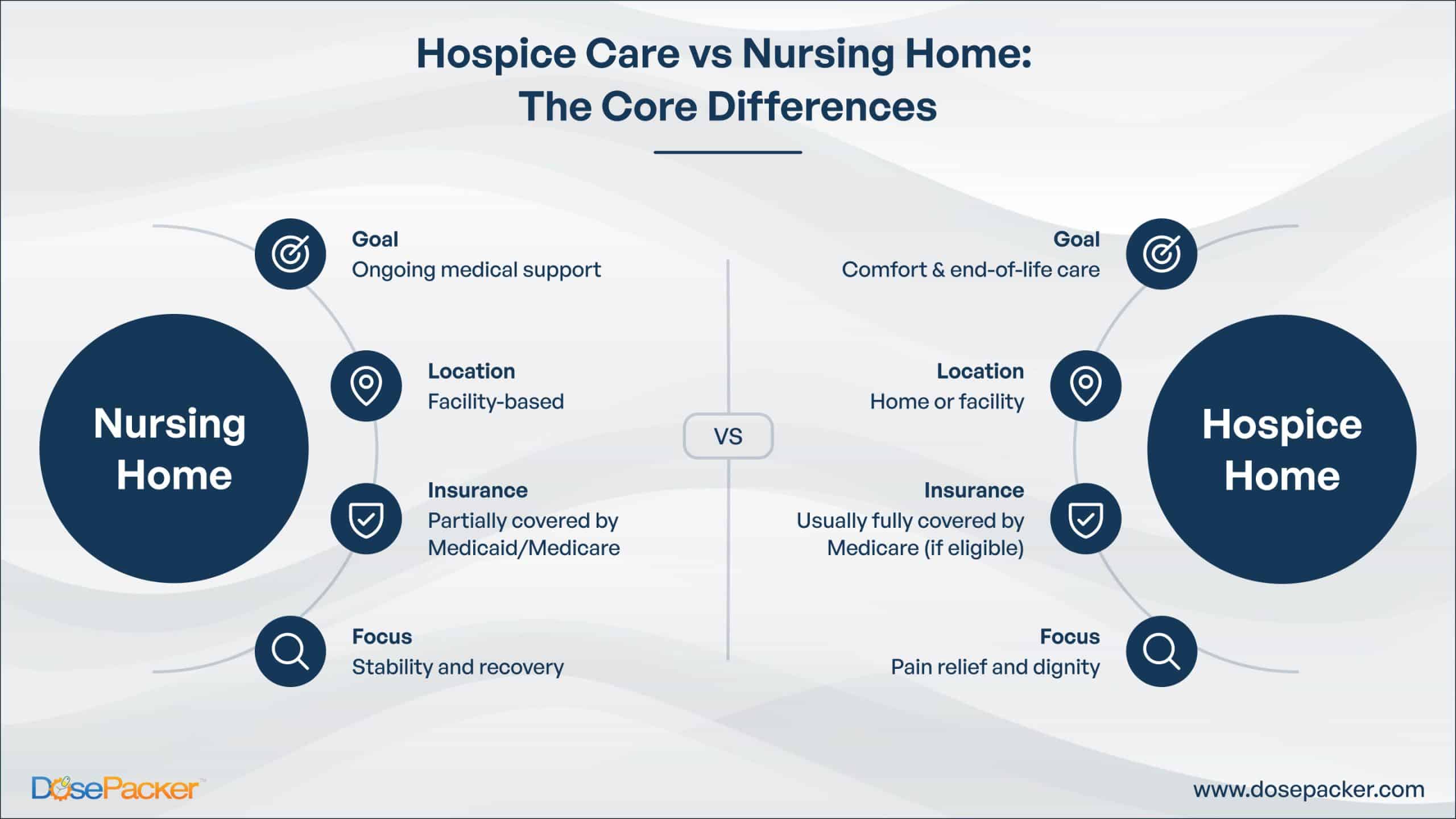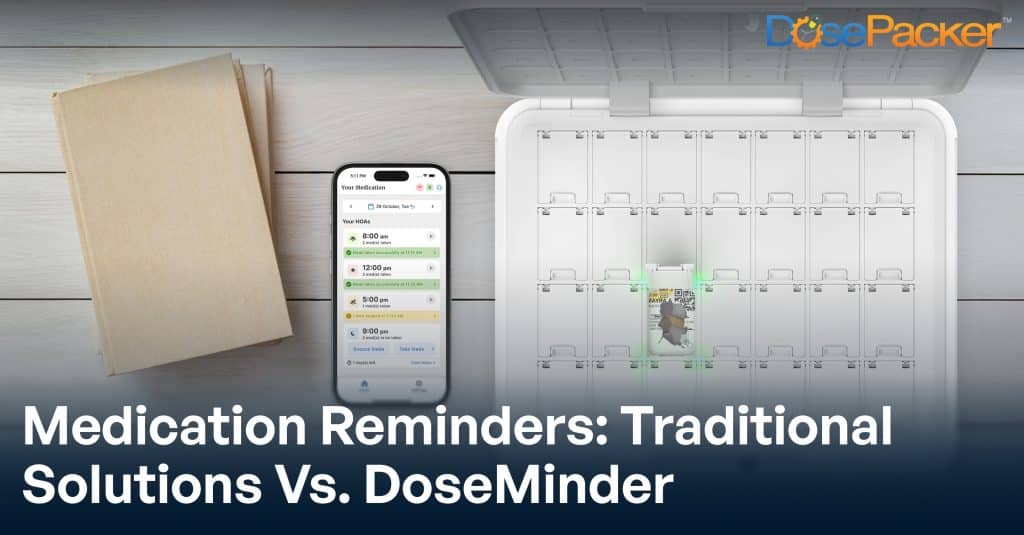- What Is a Nursing Home?
- What Is Hospice Care?
- Hospice Care vs Nursing Home: The Core Differences
- Medication Management: A Common Need, Different Purpose
- Family Support and Emotional Care
- Costs: What to Consider
- A Few Questions to Guide Your Decision
- Final Thoughts: Navigating Care Optiosn with Empathy and Insight
Unlock the latest in medication management technology and grow your care community with us.

When a loved one starts needing more support, whether because of age, illness, or both, it can be hard to know where to turn. Two standard options are nursing homes and hospice care, but they’re not interchangeable. In fact, they serve very different purposes. According to the National Institute on Aging, nearly 1.4 million Americans live in nursing homes, while hospice care enrollment has grown steadily, reflecting changing preferences for end-of-life support.
If you’ve found yourself typing “hospice care vs nursing home” into Google, you’re not alone. Many families go through this decision-making process, often during a challenging or emotional time.
In this guide, we’ll walk you through the key differences between nursing home and hospice care, how to determine which one is right, and the role that the right tools, like DosePacker’s medication management solutions, play in both settings.
What Is a Nursing Home?
A nursing home is a long-term care facility for individuals who require round-the-clock support, not necessarily because they’re nearing the end of life, but because they have ongoing medical or physical needs.
You might consider a nursing home if your loved one:
- Needs help with daily tasks like bathing, dressing, or eating
- Has a chronic illness that requires medical supervision
- Is recovering from surgery or injury, but isn’t ready to return home
- Has mobility issues or cognitive impairments
Most nursing homes provide:
- 24/7 access to licensed nurses and aides
- Rehabilitation services, such as physical or occupational therapy
- Scheduled activities and meals
- Assistance with medication management
The goal here is to maintain health and function, and in some cases, to help residents regain independence.
What Is Hospice Care?
Hospice care is very different. It’s meant for people who are nearing the end of life, often with a terminal illness, and who are no longer seeking curative treatment.
Rather than focusing on recovery, hospice focuses on comfort, dignity, and quality of life. This may include pain management, emotional support, and spiritual care for both the patient and their family.
Hospice care can take place:
- In the person’s home
- At a specialized hospice facility
- Within a hospital or nursing home
If your loved one has been given a prognosis of six months or less to live, and the focus has shifted from “getting better” to “feeling better,” hospice care may be the right path.
Hospice Care vs Nursing Home: The Core Differences
Here’s where things get clearer. When you’re weighing hospice care vs nursing home, you’re really asking:
- Are we trying to improve health and function? → Nursing Home
- Are we trying to ease the journey at the end of life? → Hospice Care
It’s not just about the setting. It’s about the goals of care.

Medication Management: A Common Need, Different Purpose
Whether someone is in a nursing home or receiving hospice care, medications are a huge part of their daily routine. However, how those medications are used and why they can differ significantly.
In nursing homes, medications are used to manage chronic conditions like diabetes, high blood pressure, or infections. In hospice care, the focus shifts to symptom relief – things like pain, anxiety, and nausea.
But here’s something both settings have in common: Medication errors can happen, and when they do, they can be dangerous!
That’s where innovative tools like DosePacker’s Medication Management Solutions make a real difference.
DosePacker helps care teams:
- Track medications in real time
- Ensure correct dosages are given at the right time
- Simplify the entire process with pre-packed, labeled dose packs
- Spend less time on admin and more time with patients
If you’re considering care options, ask about the type of medication monitoring the facility uses; it matters more than you might think.
Family Support and Emotional Care
This is one area where hospice care really stands out.
While nursing homes often focus on the resident’s physical health, hospice care takes a whole-person approach, including emotional and spiritual support for both the patient and their loved ones.
Hospice teams often include:
- Nurses
- Social workers
- Chaplain
- Grief counselor
They’re not just helping someone pass away peacefully – they’re helping families prepare, cope, and eventually, heal.
Costs: What to Consider
Finances often play a role in care decisions. Here’s a quick breakdown:
- Nursing homes can cost between $9,000 and $11,000 per month, depending on the location and services provided. Medicare may cover short-term stays, but not long-term custodial care.
- Hospice care is usually 100% covered by Medicare, Medicaid, and most private insurance plans, as long as the person meets the eligibility criteria.
A Few Questions to Guide Your Decision
If you’re still unsure which option is best, consider these questions:
- What are your loved one’s current health needs?
- Is their condition terminal or chronic but manageable?
- Do they want to continue treatment, or focus on comfort?
- What kind of emotional or spiritual support would be most helpful?
- Does the care team use technology to manage medications effectively?
These questions can help guide not only the medical decision but also the personal one.
Final Thoughts: Navigating Care Optiosn with Empathy and Insight
The choice between nursing home vs hospice care isn’t easy, but it doesn’t have to be overwhelming.
It comes down to what your loved one needs most: long-term support to live safely, or comfort and dignity during their final chapter.
Both are valid. Both can be deeply compassionate. And both can be enhanced with the right tools and the right people.
If you’re in the middle of this decision, take your time. Ask questions. Visit facilities. And know that you’re doing the best you can with love at the center of it.
Need help improving care delivery? Learn how DosePacker’s solutions make medication monitoring simpler, safer, and more accurate in both nursing homes and hospice settings.
































